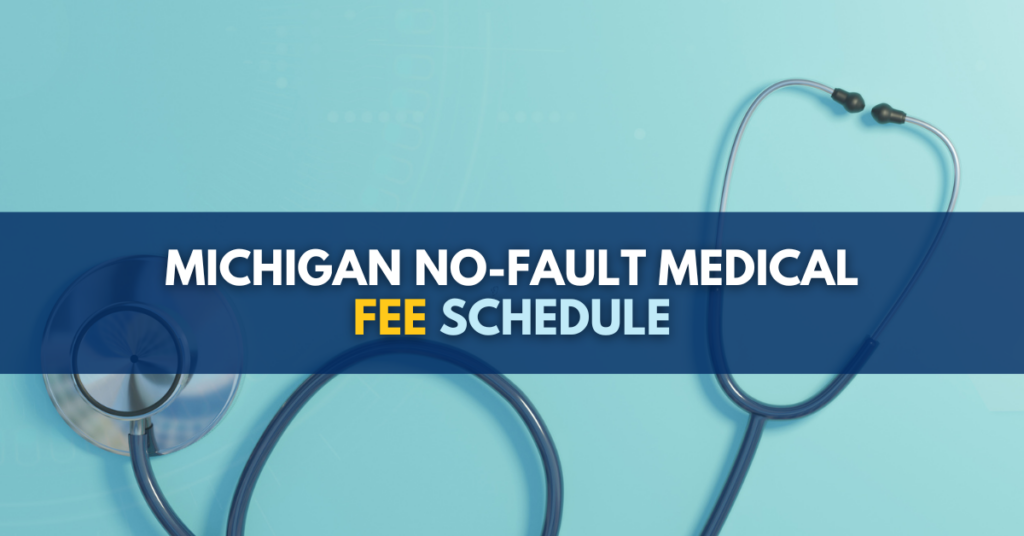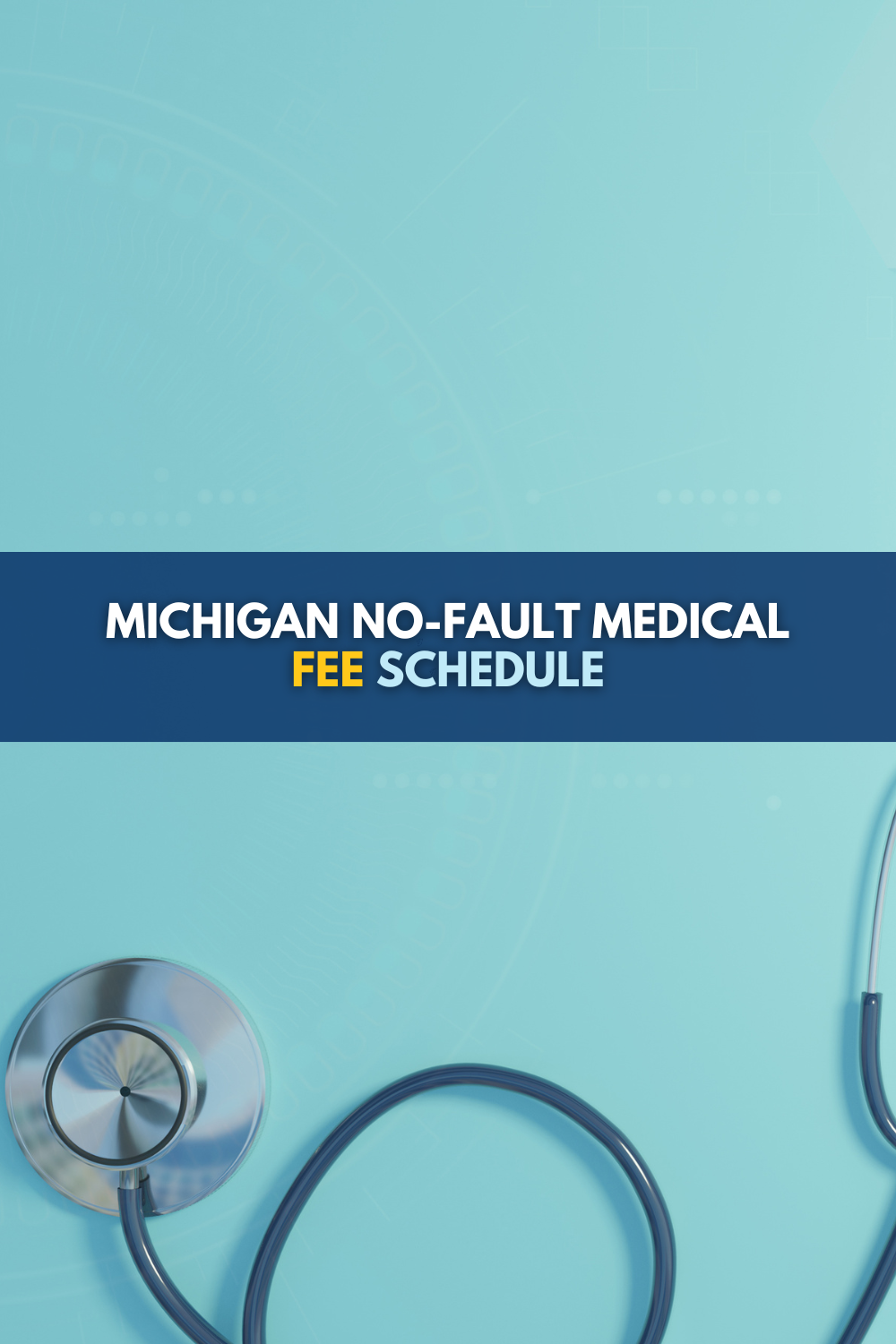
The Michigan No-Fault medical fee schedule imposes restrictions on reimbursement rates for medical care providers who care for and treat car accident victims. Although the law empowers providers to charge a “reasonable amount” for their care, any amount that exceeds the fee schedule will not be paid.
Under the Michigan Supreme Court’s ruling in Andary v. USAA, the No-Fault medical fee schedule does not apply to insured car accident victims whose crash occurred before the effective date – June 11, 2019 – of the law that created the fee schedule.
For victims who were injured after that date, the fee schedule took effect on July 2, 2021.
The fallout from the fee schedule has been and will continue to be horrible for crash victims.
Specifically, the Michigan No-Fault fee schedule negatively impacts victims and the medical professionals and caregivers who care for them in two ways: (1) victims don’t have needed resources through the No-Fault system to pay for and, thus, to obtain the care and treatment that is essential to their recovery from their injuries, and (2) victims can’t find people to care for them for the fee schedule amounts because many of the providers who used to do so either stopped accepting auto accident cases or were driven out of business.
Indeed, several of Michigan’s most respected and specialized TBI and spinal cord medical care providers have had to close their doors.
On the other hand, the financial windfall for the insurance companies from the fee schedule has and continues to push insurer profits higher and higher.
It allows insurers to pay out less money on claims and thus keep more of their insureds’ premium dollars, which, of course, grows their sizeable profits even faster.
For many doctors and attendant care providers, insurers now only need to pay about half of what they were paying before. Nearly 50 cents on every dollar that used to be paid out to the doctors and care providers for their medical services to car crash victims now stays in the insurance companies’ pockets.
Yet, that means that providers are now forced to provide the same services they did before the fee schedule, but at a cost of 45% less – even though their expenses, costs, and overhead remain just as high (and are increasing all the time) as they were previously.
The benefit that Michigan auto insurance companies enjoy as a result of the No-Fault medical fee schedule was best summed up by Eric Poe, president and CEO of Cure Auto Insurance, in an interview with Crain’s Detroit Business for its “Crain’s Forum” article on “Auto Insurance Reform.”
Crain’s Detroit Business reported:
“Poe said since the medical fee schedule was instituted, no-fault insurance is now the most profitable line of car insurance in Michigan.”
What is the Michigan No-Fault medical fee schedule?
The Michigan No-Fault medical fee schedule sets dollar-amount limits on how much doctors, hospitals, clinics, institutions, rehab facilities, attendant care providers and other persons can be paid or reimbursed under the No-Fault insurance system for providing treatment and care to car accident victims.
For some care providers, the charges and/or reimbursements they can be paid under the Michigan No-Fault medical fee schedule will be calculated as a percentage of what is payable for the same treatment and care under Medicare’s pricing structure.
For other providers whose treatment and care are not covered by the Medicare pricing structure, their charges and/or reimbursement rates will be set at 52.5% of what they charged on January 1, 2019.
The fee schedule statute also requires that the amount that doctors, hospitals, clinics, rehabilitation specialists and attendant care providers charge for caring and treating car accidents must be a “reasonable amount” and not more than they would “customarily” charge in cases that did not involve insurance. (MCL 500.3157(1)) However, these factors are largely irrelevant in light of the fee schedule limits. For instance, even if the amount that a doctor or an attendant care provider charges for their services is both “reasonable” and not more than what they would “customarily” charge if insurance was not the payor, they will not be entitled to be paid that amount if it exceeds the maximum “amount payable” under the fee schedule.
When did the new Michigan No-Fault medical fee schedule take effect?
The Michigan No-Fault law says that the medical fee schedule applies to “treatment or rehabilitative occupational training” that is “rendered after July 1, 2021.” (MCL 500.3157(14)) Treatment is defined as including, but not being limited to, medical products, services, and accommodations. (MCL 500.3157(15)(k))
What about crash victims who were injured before the fee schedule took effect?
Car accident victims who were injured in crashes before June 11, 2019, and who were covered by valid, No-Fault auto insurance policies at the time are not subject to the Michigan No-Fault medical fee schedule. In other words, it doesn’t apply to insured victims whose accidents occurred before the law took effect.
In Andary v. USAA, the Michigan Supreme Court ruled that the No-Fault medical fee schedule does not apply to a car accident victim “who was injured while covered by an insurance policy issued before June 11, 2019,” which was the date the law that created the fee schedule took effect.
The state’s high court also noted that for insured victims whose accidents occurred before June 11, 2019, the terms of their policies and the provisions of the No-Fault law that existed at the time of their auto accidents “control their entitlement to PIP benefits, not the amended provisions enacted” in 2019 which added created the Michigan No-Fault medical fee schedule.
What are the reimbursement rates under the Michigan No-Fault medical fee schedule?
The reimbursement rates under the Michigan No-Fault medical fee schedule include: (1) 56 hours-per-week limit on in-home, family-provided attendant care; (2) 190% of Medicare rate for covered treatment; and (3) 52.5% of providers’ 2019 rates for non-covered treatment.
Here is more detail about the reimbursement rates under the Michigan No-Fault medical fee schedule:
- Limit on number of hours covered for in-home, family-provided attendant care: For in-home, family provided attendant care that is provided to a car accident victim, the auto insurance company is only required to pay for 56 hours per week. (MCL 500.3157(10) and (14)) That means that if a victim’s doctor recommends 24/7 attendant care, then the auto insurance company is only required to compensate the in-home, family-provided provider for 56 of the 168 hours involved. Either the provider will work for free for the other 112 hours – or the victim’s auto insurance company will have to hire an agency to provide the care or the victim will have to go without the recommended attendant care.
- Limit on reimbursement rate for care providers (whose services are covered by the Medicare pricing structure): For physicians, hospitals, clinics and other persons who provide “treatment or rehabilitative occupational training” to car accident victims, their reimbursement under the Michigan No-Fault medical fee schedule is limited 190% of the “amount payable” under the Medicare pricing structure for treatment and training. (MCL 500.3157(2)(c)) [Note: “Person” includes “an institution.” (MCL 500.3157(15)(h)); “Treatment” encompasses “but is not limited to, products, services, and accommodations.” (MCL 500.3157(15)(k))
- The Michigan No-Fault medical fee schedulet has a Limit on the reimbursement rate for care providers – such as attendant care providers – whose services are NOT covered by the Medicare pricing structure: If the Medicare pricing schedule “does not provide an amount payable” for the “treatment or rehabilitative occupational training” provided to a car accident victim, then the reimbursement rate for the “physician, hospital, clinic, or other person” that provided it is 52.5% of what the provider charged at the beginning of 2019. (MCL 500.3157(7)(a)) [Note: “Person” includes “an institution.” (MCL 500.3157(15)(h)); “Treatment” encompasses “but is not limited to, products, services, and accommodations.” (MCL 500.3157(15)(k))
- DILEMMA/GAP FOR IN-HOME, FAMILY-PROVIDED ATTENDANT CARE PROVIDERS WHO WERE NOT PROVIDING CARE ON JANUARY 1, 2019: Although the law uses January 1, 2019, as the benchmark for setting reimbursement rates for services not covered by the Medicare pricing structure, the law does not address what happens when an attendant care provider was not providing care on January 1, 2019, such as in the case where the crash that necessitated the care did not occur until years later. Should the “reasonable charges” standard in MCL 500.3157(1) apply? (“[A] physician, hospital, clinic, or other person that lawfully renders treatment to an injured person for an accidental bodily injury covered by personal protection insurance, or a person that provides rehabilitative occupational training following the injury, may charge a reasonable amount for the treatment or training.”) Or are “new” attendant providers to be denied all compensation in light of the language in MCL 500.3157(7)(a) that their reimbursement rate is dependent on what they were charging on January 1, 2019?
Have questions? Call the car accident attorneys at Michigan Auto Law
If you have questions on how the Michigan No-Fault medical fee schedule affects you or a loved one, call now at (800) 968-1001 for a free consultation with one of our experienced car accident lawyers. There is no cost or obligation. You can also visit our contact page or use the chat feature on our website.
Michigan Auto Law is Michigan’s largest and most successful law firm that specializes exclusively in helping people who have been injured in auto accidents.
Our secret? Our attorneys deliberately handle fewer cases than other personal injury law firms. This allows us to focus more time and attention on our cases.
Unlike other law firms, our attorneys are never too busy to promptly return phone calls and answer questions.
We have more than 2,000 5-Star reviews that reflect this care and attention to detail.
More importantly, this client-focused approach leads to better and faster settlements for our clients. Michigan Auto Law has recovered more million-dollar settlements and trial verdicts for motor vehicle accidents than any other lawyer or law firm in Michigan. We’ve also recovered the highest ever reported truck accident and car accident settlement in the state.
Call now so we can start making a real difference for you.




What happens to survivors of catastrophic automobile accidents that are living in Residential Facilities? I’ve been injured for 31 years and now I’m just out of luck? This is sickening.
Post injury 38 years, home owning, 40 hour job, community contributor. Will lose my caregivers and won’t be able to live at home. Will be forced to an institution. No home, no job, no life!